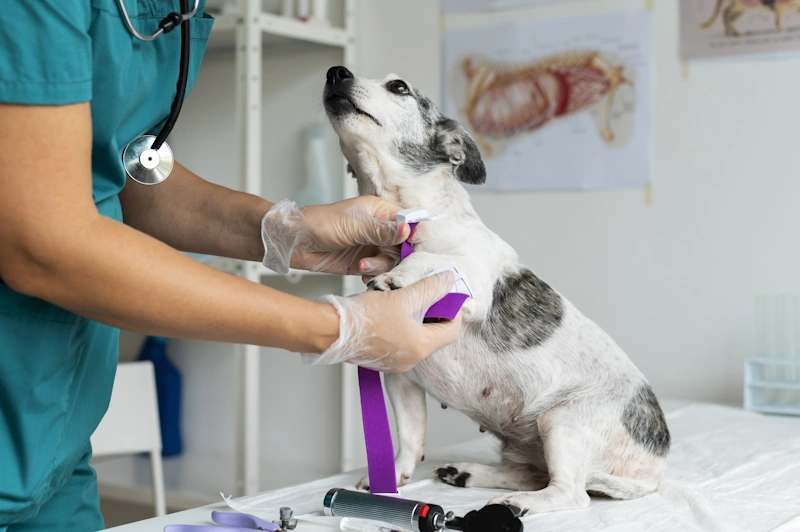As responsible pet owners, it is crucial to be prepared for any vet emergency. Like humans, our beloved pets can experience unexpected health issues that become a vet emergency. Knowing what a vet emergency may look like and seeking prompt veterinary consultation can differentiate life and death for our furry companions.
1. Difficulty Breathing
If your pet is struggling to breathe, it is a critical emergency. It may indicate an obstruction in the airway or a severe respiratory condition. Contact us for this vet emergency immediately.
2. Uncontrolled Bleeding
Any severe bleeding that cannot be easily controlled should be considered an emergency. Apply pressure to the wound and seek immediate veterinary assistance.
3. Ingestion of Toxins
Contact us for this vet emergency if your pet has ingested a toxic substance such as chemicals, medications, or certain foods like chocolate, grapes, or onions. Time is crucial, and we will guide you on the necessary steps.
4. Severe Vomiting or Diarrhea
Persistent vomiting or diarrhea can lead to dehydration and electrolyte imbalances. It could indicate a gastrointestinal blockage, infection, or poisoning, making this scenario a definite vet emergency.
5. Seizures
Various underlying conditions can cause seizures and may range from mild to severe. If your pet experiences a seizure lasting longer than a few minutes or has multiple seizures in a short time, seek immediate veterinary care.
6. Trauma
In case of accidents, falls, or any other physical trauma, it’s crucial to have your pet examined by a veterinarian. Even if no signs of injury exist, internal damage may have occurred.
7. Heatstroke
Pets are susceptible to heatstroke, especially in hot weather. Symptoms include excessive panting, drooling, weakness, and collapse. Move your pet to a cool place and contact The Sunshine Pet Hospital for this vet emergency.
8. Sudden Paralysis
If your pet suddenly loses the ability to move its limbs or experiences weakness, it may be a sign of a spinal injury or neurological disorder. Seek veterinary help immediately.
9. Allergic Reactions
Severe allergic reactions, such as facial swelling, difficulty breathing, or hives, require immediate veterinary attention. Insect bites, medications, or certain foods may cause these reactions and trigger a vet emergency.
10. Eye Injuries
Any injury to the eye, including redness, swelling, discharge, or cloudiness, requires immediate veterinary care. Eye injuries can be painful and may lead to permanent damage if left untreated. Whether from accidents, foreign objects, or underlying conditions, eye injuries can cause pain and potential vision loss if not promptly addressed. Recognizing the signs of an eye injury in pets, seeking immediate veterinary care, and taking preventive measures are essential for preserving your pet’s ocular health.
Accidents, fights with other animals, or contact with sharp objects can result in corneal abrasions, lacerations, or blunt trauma to the eye. Foreign bodies, such as dust, debris, grass seeds, or small particles, can cause eye irritation, scratching, or lodging.
11. Inability to Urinate
If your pet is straining to urinate or unable to pass urine, it may indicate a urinary blockage, which is life-threatening, especially in male cats. Contact us for this vet emergency immediately.
12. Unconsciousness
If your pet becomes unconscious or unresponsive, it is a severe emergency. Contact your veterinarian or bring your pet to an emergency veterinary clinic immediately.
13. Broken Bones
If you suspect your pet has a broken bone, do not attempt to set it yourself. Restrict your pet’s movement and seek veterinary assistance promptly to prevent further injury or complications. Recognizing the signs of a broken bone and the importance of seeking prompt veterinary intervention is crucial for ensuring the well-being and recovery of our furry companions.
Pets can sustain broken bones due to various factors, including falls, accidents, trauma from vehicular incidents, or even rough play. Elderly pets or those with weakened bones due to underlying conditions like osteoporosis or cancer may be more susceptible to fractures.
14. Collapse or Weakness
If your pet collapses or experiences severe weakness, it could indicate a serious underlying condition such as heart disease or organ failure. Contact your vet immediately. Collapses can occur for various reasons and may indicate a severe medical condition. Understanding the potential causes and promptly seeking veterinary care is crucial to ensuring the well-being and recovery of our furry friends.
Heart problems, such as congestive heart failure, arrhythmias, or heartworm disease, can lead to weakness or collapse in pets. These conditions may cause inadequate blood flow, oxygenation, or impaired heart function. Veterinary evaluation is essential to diagnose and manage cardiovascular disorders effectively.
15. Difficulty Giving Birth
If your pregnant pet has difficulty giving birth, such as prolonged labor or visible distress, seek immediate veterinary assistance. Complications during labor can be life-threatening for both the mother and her offspring.
Just like humans, pets can experience complicated pregnancies that require special attention and veterinary care. Understanding the risks and knowing when to seek professional help is crucial for the well-being of both the mother and her unborn offspring.
Prolonged labor, or dystocia, occurs when the birthing process exceeds the expected timeframe. It can be caused by large litter, malpositioned fetuses, or maternal health issues. Prolonged labor can result in fetal distress and endanger the mother’s health. Veterinary assistance should be sought immediately if labor does not progress within a reasonable time frame.
After giving birth, the mother must expel the placenta (afterbirth) quickly. If the placenta remains in the birth canal or uterus, it can lead to infection and other complications. Pet owners should monitor the expulsion of the placenta and consult a veterinarian if any abnormalities or difficulties arise.
Does your pet have a vet emergency right now? Don’t wait. Contact The Sunshine Pet Hospital for emergency vet services right away.


